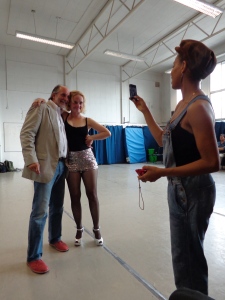After a long hiatus I finally made it to another text intensive workshop with the amazing Yorgos Karamalegos of Tmesis Theatre and LAMDA.
The workshops explore ways of using the body to connect with the play text of a character, and help you ‘get out of your head’ when preparing a role. This time we also did some voice work, which I found particularly useful for my preparation of Lizzie in One Off Productions‘ performance of Pride and Prejudice this month.
The workshop took place at Chisenhale Dance Space – a new location for me – and with under ten participants it was a smaller group than previous workshops I’d been to. This allowed a much more intimate feeling and made it easier to dispel any nerves or feelings of self-consciousness.

Image courtesy of Yorgos Karamalegos
We started with the pleasure exercise, which by now is familiar ground for many of us – a chance to really listen to your body and let it lead you to whatever movement, stretch or pose it wishes to do. The principle is perfectly simple, the exercise amazingly effective. We writhed and wriggled, groaned and laughed, danced and stretched our way around the room, engrossed in our own bodies but also aware of the collective. At one point a man started making a deep guttural sound that gradually rose in pitch and volume, and one by one we all joined in until a powerful chorus of voices climbed to the ceiling and rang out across the room.
After this we started moving into various positions, searching for how each vowel sounded to us at that particular moment, letting our bodies guide us. I found ‘ahh’ crouching low with half my weight on my hands, leaning forward a little. It felt like an earthy, primal sound, so it felt right to be close to the ground. It was as if I was drawing the sound up from the earth below me into my body, where it travelled through my core before radiating out from my mouth in a swell of warmth.
Once we had found a position or simple movement that represented how each sound physically felt, we took a phrase of no more than nine words from whatever monologue or piece of text we had prepared, and focused on speaking those words while making the accompanying physical response. I worked on a phrase from Lizzie’s rejection of Darcy’s first proposal: ‘But you could not have made me the offer of your hand’ (ok, so I had 12 words).
All of a sudden the words were filled with a deeper meaning, which came through in my voice and their delivery. The word ‘offer’ was loaded with Lizzie’s resentment of Darcy’s offer. ‘Hand’ became almost a retch of sound, as her disgust at the thought of marrying such a man coursed through me and my words.
One of the key benefits of this exercise is to give every word space. So often we run over certain words in our lines, especially ones we may not deem that important. We throw away conjunctions, prepositions and articles. We drop words at the end of sentences. This exercise made me focus on each word in turn, giving each one equal attention and importance.
I come away from every one of Yorgos’ workshops with a new tool or exercise to help me with my acting and character preparation. We spend so long bogged down with our minds when preparing a role, it’s a refreshing approach to let the body lead you, and I look forward to experimenting and exploring this in many more workshops to come.
For more information about Yorgos’ Physical Lab workshops, go to www.yorgosk.com/physicallab.htm.




